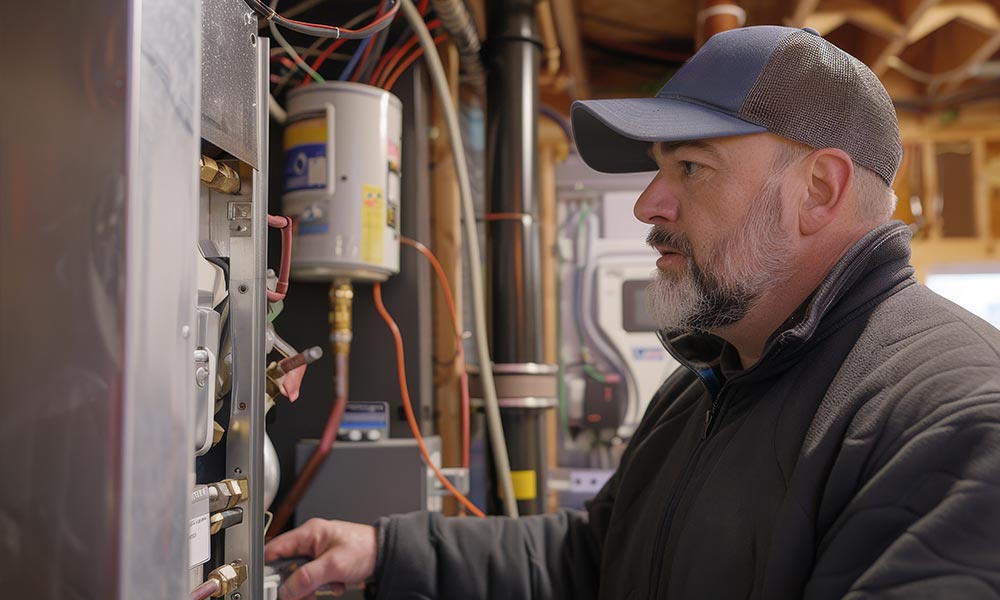Keeping your home warm during Central Oregon’s chilly months doesn’t just depend on having a furnace—it depends on having the right furnace. But with so many options out there, from efficiency ratings to added features, it’s easy to feel overwhelmed. One of the first questions homeowners often ask is, “How much does a furnace cost?” While price is important, understanding the factors that influence that cost and how to maintain your system can make all the difference in comfort and savings. Read on to find the answers to that and more!
How Much Does a Furnace Cost?
The cost of a furnace can vary widely, depending on several key factors:
- Type of Furnace: Gas furnaces tend to cost more upfront than electric ones, but they’re generally more efficient and cost-effective to run in the long term.
- Size: Larger homes require larger furnaces to heat the space effectively, which increases the cost. Furnace size is measured in BTUs (British Thermal Units), and a professional HVAC technician can help determine the right size for your home.
- Efficiency Rating: High-efficiency furnaces with an Annual Fuel Utilization Efficiency (AFUE) rating of 90% or more are more expensive upfront but save money over time through lower energy bills.
Additional features such as variable-speed blowers, smart thermostats, or zoning systems can add to the cost of a furnace but can also enhance comfort and energy efficiency. When considering the cost of a furnace, it’s essential to weigh these factors and choose a system that best meets your home’s heating needs and budget.
Average Costs:
- Entry-Level Models: $5,00 to $7,00 (including installation)
- Mid-Range Models: $7,000 to $9,000
- High-End Models: $9,000 or more=
As we tell our customers, the total cost will depend on installation complexity and whether additional work, like duct repairs, is required. If swapping a system like for like (vs. a higher efficiency system), prices could be less. In general, it depends not only on the equipment but the material cost. We always offer a free consultation prior to services.
Answering Other Common Questions About Furnaces
How Long Will a Furnace Last?
The lifespan of a furnace can vary depending on factors such as maintenance, usage, and the quality of the unit. On average, a well-maintained furnace can last between 15 to 25 years (depending on type and usage).
To extend your furnace’s lifespan:
- Schedule annual maintenance to ensure all components are working efficiently.
- Replace air filters regularly to prevent strain on the system.
- Address minor issues promptly to avoid larger, more expensive repairs.
How Often Should I Change My Furnace Filter?
Changing the furnace filter is a vital maintenance task that helps ensure the efficiency and longevity of your system. We recommend checking your furnace filter monthly and replacing it every 1 to 3 months. High-efficiency filters may only need to be replaced every 6 to 12 months. Every home is different, so checking your filter often and adjusting it is the gold standard.
However, homes with pets, smokers, or allergy sufferers may need more frequent filter changes due to increased dust and allergens in the air. A clean filter improves airflow, efficiency, and indoor air quality.
What Are Signs It’s Time to Replace a Furnace?
Knowing when to replace your furnace is essential to avoid unexpected breakdowns and inefficiencies. If your furnace is more than 15 years old, requires frequent repairs, or is not providing adequate heating, it may be time for a replacement.
Watch for these warning signs:
- Frequent Repairs: If repairs are becoming more common and costly, a replacement may be more economical.
- Rising Energy Bills: Older systems lose efficiency over time, driving up energy costs.
- Inconsistent Temperatures: Uneven heating throughout your home can indicate your furnace is struggling.
- Strange Noises or Smells: Banging, rattling, or unusual odors may point to serious issues.
Upgrading to a modern, energy-efficient furnace can provide greater comfort and long-term savings.
What’s Involved in Furnace Installation?
Professional furnace installation includes more than just placing the unit in your home. Here’s what you can expect:
- Sizing and Selection: A Bend Heating estimator will assess your home’s heating needs and recommend the right furnace.
- Ductwork Inspection: Proper ductwork is essential for efficiency and even heating. Repairs or updates may be necessary.
- Installation and Testing: The furnace will be installed, connected to your home’s HVAC system, and thoroughly tested to ensure it operates correctly.
A professional HVAC technician has the knowledge and experience to install your furnace correctly, ensuring optimal performance and longevity.
Why Invest in a High-Efficiency Furnace?
While high-efficiency furnaces cost more upfront, they can significantly reduce your energy bills over time. With an AFUE rating of 90% or higher, these systems convert most of the fuel into heat, minimizing waste. Additionally, many high-efficiency models qualify for rebates or tax incentives, offsetting the initial investment.
Stay Warm With Expert Furnace Solutions
“How much does a furnace cost?” is just the beginning of good research. By understanding common questions about furnaces, you can make informed decisions to ensure the comfort and efficiency of your heating systems.
Have more questions or need professional advice? Contact us today to schedule a consultation and ensure your home stays warm and comfortable all winter long!
